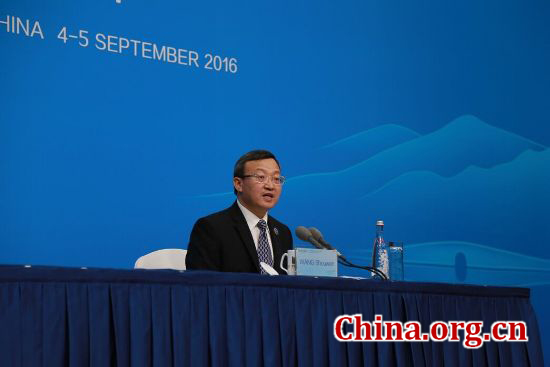G20 to pave way for acceptance of trade facilitation agreement
|
|
|
Chinese Vice Minister of Commerce Wang Shouwen holds a press conference on Saturday prior to the G20 meeting. [He Shan/China.org.cn] |
As the world is still mired in an anemic economic recovery, the G20 Hangzhou summit on Sept. 4-5 will help pave the way for world trade expansion through ratification of the WTO Trade Facilitation Agreement (TFA) from all group members by the end of this year, Chinese Vice Minister of Commerce Wang Shouwen has said.
He told reporters at a press conference on Saturday that China will use its current presidency of the G20 to urge all its fellow members to take this vital step.
Concluded at the WTO's 2013 Bali Ministerial Conference, the TFA contains provisions for expediting the movement, release and clearance of goods, including those in transit. It also provides measures for effective cooperation between customs and other appropriate authorities on trade facilitation and customs compliance issues.
The vice minister said 90 WTO members have ratified the agreement; however, 18 more ratifications are needed to reach the required two-thirds majority for the agreement to go into force.
China believes implementation will deliver benefits to business entities around the world, he stressed.
A B20 (Business 20) report released in July containing policy recommendations for the G20, said member countries should ratify the TFA by the end of 2016 and urge all other WTO members that have yet to take this step to do so.
According to the report, world trade and investment continue to slow significantly in the headwinds facing the world economy, indicated by the fact that, in 2015, global trade grew by only 2 percent.
In the same year, China's foreign trade slipped by 8 percent, representing the worst performance since 2009.
China decided to accept the protocol in September 2015, it being the first multilateral agreement covering trade in goods that China has been engaged in after joining the WTO.
Implementation of the TFA has the potential to increase global merchandise exports by up to US$1 trillion annually, according to the WTO's flagship World Trade Report released on October 26, 2015.
Zhang Lin, assistant research fellow at the Chinese Academy of Social Sciences told China.org.cn that to ensure the TFA comes into force and thus implemented will create huge momentum to China's foreign trade hit by the economic slowdown.
According to WTO estimates, its implementation may help reduce trade costs by up to 15 percent.
However, it will still take some time for all WTO members to ratify the agreement as efforts wary widely across the world.
"Some countries hesitate to ratify TFA because of domestic protectionist sentiment and a low level of free trade,"said Zhang. "Opening domestic market is bound to meet with opposition from sectors that could be hurt by an influx of foreign goods when they don't have the necessary competitive edge.
"There is still pressure for ratification,"she added.









Go to Forum >>0 Comments